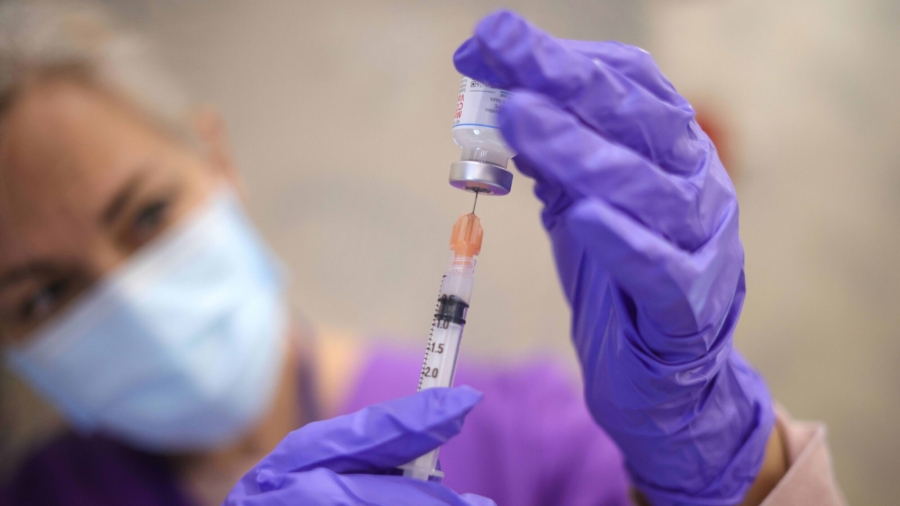Moderna said on Dec. 20 that its existing COVID-19 vaccine booster shot sharply increased Omicron neutralizing antibody levels in laboratory testing, with the drugmaker adding that it continues to work on an Omicron-specific booster.
The company said in a statement that its currently authorized 50 microgram dose booster of its mRNA-1273 vaccine increased Omicron neutralizing antibody levels 37-fold, while a not-yet-approved 100 microgram dose booster raised them 83-fold.
Moderna said researchers observed a “trend toward slightly more frequent adverse reactions” with the higher booster dosage, comparable to those seen after the two-dose primary regimen, characterizing it as “generally safe and well tolerated.” Moderna’s 50 microgram COVID-19 booster was authorized in October, with the company’s first two shots being 100 microgram doses.
While Moderna continues to work on developing an Omicron-specific third shot, called mRNA-1273.529, the firm said it considers its existing booster the “first line of defense” against the Omicron variant of the CCP (Chinese Communist Party) virus, also known as SARS-CoV-2.
Stéphane Bancel, chief executive officer of Moderna, called the findings of the lab study a “reassuring” development.
“The dramatic increase in COVID-19 cases from the Omicron variant is concerning to all. However, these data showing that the currently authorized Moderna COVID-19 booster can boost neutralizing antibody levels 37-fold higher than pre-boost levels are reassuring,” Bancel said in a statement.
“To respond to this highly transmissible variant, Moderna will continue to rapidly advance an Omicron-specific booster candidate into clinical testing in case it becomes necessary in the future,” Bancel continued. “We will also continue to generate and share data across our booster strategies with public health authorities to help them make evidence-based decisions on the best vaccination strategies against SARS-CoV-2.”
While both the Moderna and the Pfizer-BioNTech vaccines have been linked to cases of heart inflammation, particularly in young men, a recent study suggested Moderna’s vaccine is likely to cause the heart inflammation at a higher rate. Still, the researchers behind the study, published Dec. 16 in the British Medical Journal, said that both Moderna and Pfizer vaccines were associated with about a 50 percent reduced risk of cardiac arrest or death compared to unvaccinated people who get sick with COVID-19.
Omicron, a highly mutated and more contagious variant of the CCP virus, has spread fast around the globe after being first detected last month in southern Africa. The World Health Organization (WHO) reported on Saturday that Omicron cases have now been reported in 89 countries, and that the number of infections was doubling every 1.5 to 3 days in areas with community transmission.
While some preliminary indications suggest Omicron may be less virulent, and so less dangerous, the WHO said there is still limited data on its severity.
“A lot of the initial reports are that people with Omicron tend to have milder disease but it doesn’t mean that it’s not dangerous, it doesn’t mean that it’s quote unquote ‘only mild,’” Dr. Maria Van Kerkhove, an infectious disease epidemiologist and COVID-19 technical lead at the WHO, said on Dec. 16.
“With increased transmissibility, you’re going to have more cases,” she continued. “More cases mean more hospitalizations. More hospitalizations will mean more deaths.”
Health experts in South Africa have said Omicron was not driving up hospitalizations or fatalities in the country to a significant degree.
Omicron is expected to become the most dominant strain in the United States within a few weeks, according to White House COVID-19 adviser Dr. Anthony Fauci, who warned that hospitals risk becoming overwhelmed.
From The Epoch Times


